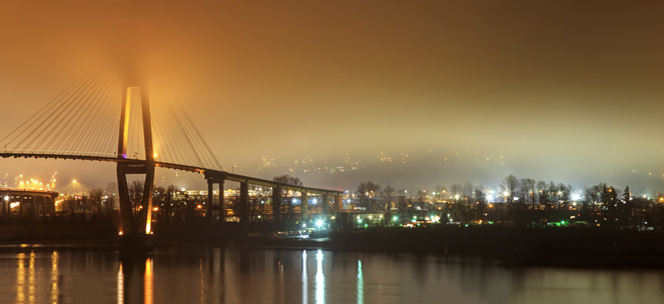BC: Five Months After the NO Vote, TransLink Questions Remain

Peter Fassbender and Todd Stone were in Ottawa this week, where the two provincial ministers climbed on to Santa Trudeau’s lap and made their pitch for B.C.’s infrastructure wish list.
We know the components – Surrey light rail, the Arbutus subway, the Massey and Pattullo bridges, expanding Highway 1 in central B.C., the Crowsnest highway – but the provincial government has been cagey about what its priorities are. On Voice of BC, Fassbender said he had a “clear ask.” But what came first in that ask? (Photo: Translink/Ian Fisher/Flickr)
Is Fassbender even sold on the TransLink mayors' plan? In that same Voice of BC interview, he mentioned a “Fraser Highway extension of SkyTrain” – a big switch from the 17 km light rail line the mayors took to voters this spring.
But let's not get ahead of ourselves. The bigger problem is that Santa Trudeau's bag is not nearly as full of taxpayer money as people think, despite the promise of nearly $20 billion in transit spending.
Digging into the Liberals' election platform, one sees this spending is back-loaded – only $5.65 billion is set for the next four years.
That sounds like big money, but it's an even bigger country. If you divide the dollars by population, British Columbia would get $735 million of this new money over the next four years, or $184 million annually. That’s for all of B.C. – Metro Vancouver’s share, based on population, would be $97 million per year.
This money comes on top of the Conservatives’ Building Canada fund, which, using the same formula, would be another $96 million for Greater Vancouver, although this could go to transit, road, water or sewage projects – all of which are needed. So, at best, and without robbing the rest of the province, Metro Vancouver could get $193 million per year for the federal share of big infrastructure projects.
Fassbender’s wish list includes more than $7 billion just in transportation projects, a number that will go up as TransLink updates cost estimates and the province pushes for Fraser Highway SkyTrain. This makes it tough to see how Ottawa can increase its share of transit funding without having to cut other priorities off the list. Victoria has a similar problem, with demands for new schools, hospitals, university facilities, and other infrastructure pressing in.
And Fassbender hasn't addressed a core concern for hundreds of thousands of taxpayers, expressed during the campaign that sent the TransLink sales tax down to landslide defeat: TransLink is still broken, still lacking the public's confidence.
Cleaning out the executive suite was a good start, but the new CEO needs time and space to rebuild the organization properly. This is not some public perception problem, as Fassbender likes to suggest, but a real, deep consensus among taxpayers: TransLink is not run properly.
Discussions about road pricing or other Hail Mary tax plans are premature until TransLink proves it has learned its lessons, and becomes more efficient and effective in the public's view.
Finally, as set out in the No TransLink Tax campaign's Better Plan, the TransLink mayors could fully fund the region's share of their plan by allocating 0.5 per cent of their cities’ annual revenue growth to the projects. The numbers are out for 2014, and the Lower Mainland municipalities enjoyed another 4.8 per cent revenue boost last year. Put 0.5 per cent into transportation, and they'd still have had 4.3 per cent more to spend on other priorities.
Don't let the TransLink mayors off the hook. In the past two decades, city hall revenue has grown twice the rate of the BC government's, twice the rate of the federal government's, and five times the rate of inflation. The money is there if mayors simply prioritize.
It’s not easy to make priorities, a federal Liberal leader once told the nation. But it’s time these politicians rejigged theirs.